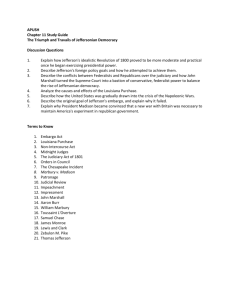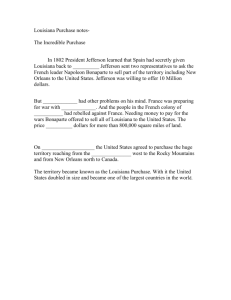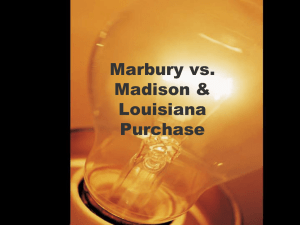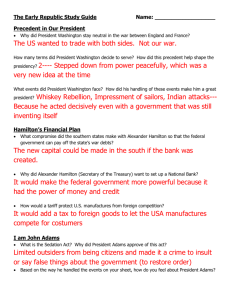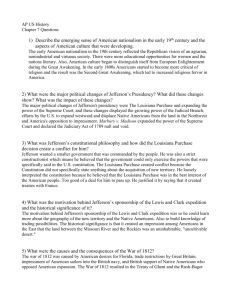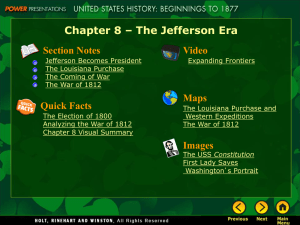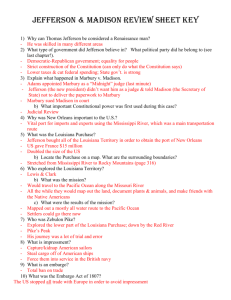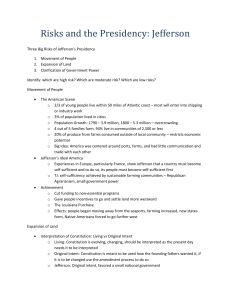File
advertisement
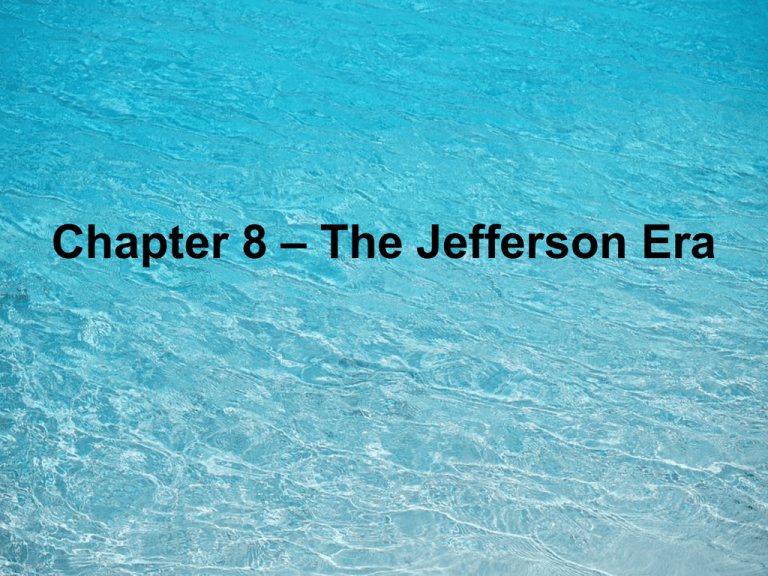
Chapter 8 – The Jefferson Era MONDAY 1.WORK ON KTP - LOOSE LEAF, DEFINITION AND SIGNIFICANCE, PAY ATTENTION TO SECTION 3 - THOSE TERMS WILL BE ON THE TEST AND WILL BE “SELF-DISCOVERY LEARNING” (NOT IN MY LECTURE NOTES) ADD THE TERM “TECUMSEH” 2.SKIM CHPTR 8 SECTION 1 AND 2 IF DONE EARLY 8.1 : Jefferson Becomes President The Big Idea Thomas Jefferson’s election began a new era in American government. Main Ideas • The election of 1800 marked the first peaceful transition in power from one political party to another. • President Jefferson’s beliefs about the federal government were reflected in his policies. • Marbury v. Madison increased the power of the judicial branch of government. The Election of 1800 • Adams and the Federalists • Rule by the wealthy class • Strong federal government • Emphasis on manufacturing • Loose interpretation of the Constitution • British alliance The Election of 1800 • Jefferson & DemocraticRepublicans • Rule by the people • Strong state governments • Emphasis on agriculture • Strict interpretation of the Constitution • French alliance The Election of 1800 • John Adams and Charles C. Pinckney (F) Vs. Thomas Jefferson and Aaron Burr (D-R). • Jefferson and Burr tied, with 73 electoral votes each. • The House broke the tie by selecting Jefferson to be president; Burr became vice president. • Leads to Twelfth Amendment – separate vote for president and vice president Jefferson’s Policies • Democratic-Republican–controlled Congress views: • Limit powers/protect civ lib • Protecting nation from foreign threats • Support will of majority •Main functions of federal government were (support views): – Allowed hated Alien and Sedition Acts to expire – Lowered military spending – Got rid of domestic taxes (whiskey) – Delivering mail – Collecting customs duties – collect, protect, deliver = main functions - kept some Federalist ideas, like Bank of U.S. Marbury v. Madison BACKGROUND • William Marbury appointed justice of peace by President Adams just before he left office • Marbury’s commission was not delivered; Jefferson took office • Marbury sued Jefferson administration to get his commission Marbury v. Madison SUPREME COURT RULING • The law Marbury based his claim on was unconstitutional—Judiciary Act of 1789 • Ruled that the Supreme Court did not hear cases like this one, according to the Constitution; thus, the law that Marbury used was unconstitutional. Importance of Judicial Review • Chief Justice John Marshall wrote Court’s opinion in Marbury v. Madison • Ruling established judicial review—Court’s power to declare an act of Congress unconstitutional • Made judicial branch equal to other two branches of government 8.2 : The Louisiana Purchase The Big Idea Under President Jefferson’s leadership, the United States added the Louisiana Territory. Main Ideas • As American settlers moved West, control of the Mississippi River became more important to the United States. • The Louisiana Purchase almost doubled the size of the United States. • Expeditions led by Lewis, Clark, and Pike increased Americans’ understanding of the West. Settlers Move West • Thousands settled b/t Appalachians & Mississippi River by 1800s • Kentucky, Tennessee, Ohio admitted as states • Depended on Mississippi & Ohio Rivers to move goods east • Jefferson worried about foreign control of New Orleans & Louisiana – Americans depended on the river, which could be disrupted if a foreign power shut down access to New Orleans Louisiana Spanish Control • Spain controlled both New Orleans and Louisiana—land stretching from Mississippi River to Rocky Mountains • Spain gave land to France in treaty Louisiana - PACKET French Control • French leader Napoléon wanted to rebuild France’s empire in North America • Rebellion in French colony of Haiti, in the Caribbean, ended Napoléon’s dream in 1802 The Louisiana Purchase PACKET • Jefferson sent ambassador to France to try to buy New Orleans • French offered to sell all of Louisiana. – Napoléon wanted to set up a North American empire – Revolt in Haiti ruined those plans • Price was $15 million • Louisiana Purchase approved by Senate on October 20, 1803 • Nearly doubled size of U.S. Explorers Head West Lewis and Clark Expedition • Expedition to explore the Louisiana Purchase • Led by Meriwether Lewis and William Clark - Included 50 skilled frontiersmen • Began near St. Louis on May 14, 1804 • Reached the Pacific Ocean in November, 1805 Contact with Native Americans Lewis used interpreters to talk to leaders of each of the peoples they met. Told them United States now owned land on which Native Americans lived. Relied on goodwill of the peoples they met. - Given food by Shoshone, Nez Percé, and others. Sacagawea, a Shoshone woman, served as a guide and interpreter. Pike’s Exploration • Zebulon Pike, army officer, led another expedition to the West in 1806 • Explored area near Louisiana Territory’s western border with New Spain • Headed into Rocky Mountains in presentday Colorado – Traveled into Spanish lands and was arrested – When finally released, still praised the opportunities for doing business with the Spanish • Pike’s report offered Americans their first description of the Southwest THURSDAY - SECTION 8.2 CONT’D. 1.ATTENDANCE 2.WE WILL FINISH READING PACKET 3.YOU AND A PARTNER WILL WORK THROUGH THE QUESTIONS - IF YOU ARE DONE WORK ON STUDY GUIDE 4.OPPOSITION TO PURCHASE VIDEO AND DISCUSSION 5.WE WILL SHARE OUT TOMORROW AND LOOK AT PRIMARY SOURCE DOCS ABOUT OPPOSITION TO THE PURCHASE SHARE OUT ANSWER KEY 1.Jefferson 2.Constitution 3.NYC - Washington, D.C. 4.Western 5.Fance and Spain 6.Shipping port to Gulf, trade, store crops until they could be exported, gateway to the world 7.Used by farmers to transport goods/supplies/surplus crops - trade & export ANSWER KEY 8. $1 MILLION 9. U.S. would be cut off from the Gulf because we did not help them as they had aided us during war 10. a) Declare war and fight for land or, b) purchase land from France 11. Napoleon Bonaparte 12. Empire 13. Sugar, raise crops, raise animals ANSWER KEY CONT’D. 14. war and yellow fever 15. Livingston and Monroe 16. $10 million 17. $15 million (3-4 cents an acre) 18. Doubled 19. Congress 20. Doubled size, opened corridor to the West, Miss. River made travel possible, can now travel across land that is not hostile FRIDAY - SECTION 8.3 1.SHARE OUT LP QUESTIONS 2.READ THROUGH SECTION 8.3 IN THE TEXTBOOK AND TAKE NOTES USING GRAPH ORGANIZER 3.HAND OUT STUDY GUIDE 4.https://www.youtube.com/watch?v=Kt sV4bWPHsY#t=94.861522 GO TO THE TMS NIGHT OUT - TROPICAL PARADISE! 8.3 : The Coming of the War The Big Idea Challenges at home and abroad led the United States to declare war on Great Britain. Main Ideas • Violations of U.S. neutrality led Congress to enact a ban on trade. • Native Americans, Great Britain, and the United States came into conflict in the West. • The War Hawks led a growing call for war with Great Britain. Violations of Neutrality • Overseas trade was profitable but risky – Barbary pirates, along the coast of Africa, captured ships – Attacks continued until the U.S. sent the USS Constitution and other warships to stop pirates • British vs. French in1803 - GOAL - each tried to stop the U.S. from aiding the other Violations of Neutrality • British started to stop American trade ships to search for runnaway British sailors – British sailors forced to return & sometimes U.S. citizens were taken by accident - Impressment of sailors – British ship Leopard stopped U.S. Navy ship Chesapeake and took sailors by force – Attack on Chesapeake stunned Americans The United States’ Response Embargo Act • Embargo Act 1807, ban trade w/all foreign countries to punish Britain & France • Devastated American merchants, who lost $$$ without trade • Damaged Jefferson & strengthened Federalists • Had little effect on Britain & France The United States’ Response Non-Intercourse Act • Congress replaced unpopular Embargo Act with NonIntercourse Act 1809 • Banned trade only with Britain, France, and their colonies • U.S. trade would resume with first side to stop violating American neutrality • No more successful than Embargo Act Conflict in the West Conflict Over Land • British and Native Americans clashed with American settlers over land in the West • British agents armed Native Americans along western frontier Tecumseh Resists U.S. Settlers • Tecumseh, a Shawnee chief, emerged as leader • Hoped to unite Native Americans of Northwestern Frontier, the South, and the Eastern Mississippi Valley • Tecumseh founded village near Tippecanoe & Wabash rivers in Indiana Territory – Tecumseh was a brilliant speaker & leader – Wanted to unite the Native Americans to resist settlers The Battle of Tippecanoe • Governor William Henry Harrison warned Tecumseh not to resist power of the United States • Harrison led army in attack on village in 1811 – Worried that with British backing, Tecumseh could be a serious threat to U.S. power in the West • U.S. forces won Battle of Tippecanoe, and Tecumseh fled to Canada Call for War War Hawks • Evidence of British support for Tecumseh inflamed Americans • Some young members of Congress from the South and West, called War Hawks, demanded war against Britain • They were angered by British trade restrictions - wanted to invade Canada-more land to settle The Opposition • New England Federalists opposed war • British trade restrictions hurt New England’s economy • Others argued that the United States was not ready to fight War Declared • Republican James Madison was elected president in 1808 – Felt growing pressure from War Hawks – Decided Congress must vote on war in 1812 • Congress voted, the War Hawks won – Congress declared war for the first time in the nation’s history • Madison was reelected in 1812 – Served as commander in chief during War of 1812 8.4: The War of 1812 FREE NOTES The Big Idea Great Britain and the United States went to battle in the War of 1812. Main Ideas • American forces held their own against the British in the early battles of the war. • U.S. forces stopped the British offensives in the East and South. • The effects of the war included prosperity and national pride. War at Sea Early Battles • Britain had hundreds of ships, scattered around the globe • Americans: less than 20 ships, well-trained sailors & new warships like the powerful USS Constitution. • American ships victorious in one-on-one battles Early Battles Along Canadian Border • American leaders wanted to invade Canada • Attacks in 1812 failed • Oliver Hazard Perry won naval Battle of Lake Erie in 1813 • American control of Lake Erie established • British driven out of Northwest in 1813 The Creek War War erupted with Native Americans in the South, who were angry at settlers pushing into their lands. Creeks attacked Fort Mims in Alabama, killing about 250 defenders. Andrew Jackson, leading 2,000 volunteers, defeated the Creeks at the Battle of Horseshoe Bend in Alabama in 1814. The Treaty of Fort Jackson ended war in 1814 and forced the Creeks to give up millions of acres of their land. Great Britain on the Offense British Attacks in East • 1814 - British attacked Washington, D.C. • Set fire to White House, Capitol • Brit shelled Fort McHenry at Baltimore, MD • Americans refused to surrender, Brit retreat Battle of New Orleans • British moved against New Orleans – Hoped to capture city/control Miss. River • Andrew Jackson commanded U.S. forces at New Orleans – Troops included regular soldiers, free African Americans, Choctaws, state militia, & pirates • Began - January 8, 1815 – 5,300 British troops against 4,500 Americans • British caught in open field; more than 2,000 casualties • American victory at Battle of New Orleans made Jackson a hero & was last major conflict of war War Ends Hartford Convention • Group of New England Federalists were going to Hartford Convention to oppose war, but the war ended before the convention • War’s end made party lose power War Ends Treaty of Ghent • Treaty of Ghent signed before negotiators knew of New Orleans • Each nation returned conquered territory gathered CAUSES AND EFFECTS OF WAR OF 1812 - DON’T FORGET TO GRAB A STUDY GUIDE! CAUSES 1.IMPRESSEMT OF SAILORS 2.INTERFERENCE OF SHIPPING 3.BRIT MILITARY AID TO NAT. AMER.’S EFFECTS 1. Feelings of patriotism among Americans 2. Power of many Native American groups broken 3. Lack of goods during blockade boosted American manufacturing SCHEDULE 1. TUESDAY - INSTRUCTIONS AND GRAPH ORG FOR ESSAY 2. WEDNESDAY - REVIEW DAY WORK ON STUDY GUIDE & ESSAY- https://youtu.be/_3Ox6vGteek skip 4:25-6:00 3. THURSDAY - TEST EDMODO CHAPTER 8, SECTIONS 1,3,4 BRING ESSAY WITH YOU & TURN IT IN
